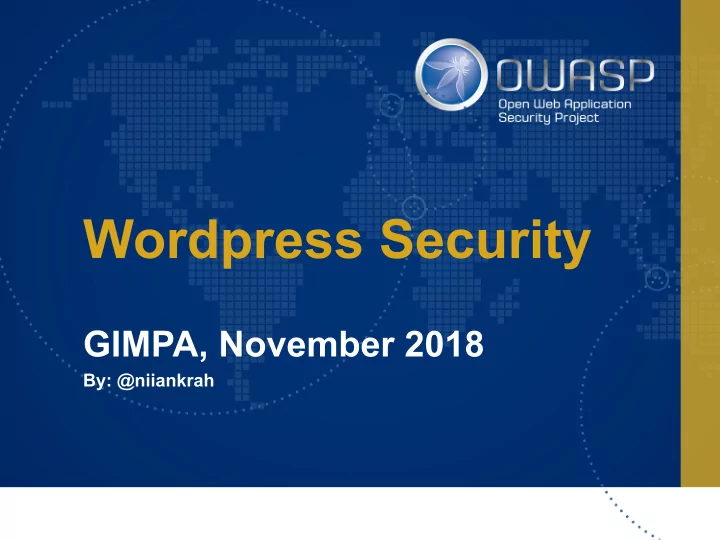

Wordpress Security GIMPA, November 2018 By: @niiankrah
What is Wordpress? • WordPress is a free and open-source content management system based on PHP and MySQL. • It uses a plugin architecture and a template system. • It is most associated with blogging, but supports other types of web content including more traditional mailing lists and forums, media galleries, and online stores. • It is also the platform of choice for over 32% of all sites across the web.
Why secure Wordpress? (1) • Wordpress is a well developed CMS solution however no product or solution has absolute security . • Plugins and Themes might not be as secure as the base WP codebase. • 41% of hacked WordPress were hacked through a security vulnerability on their hosting platform • 29% were hacked via a security issue in the WordPress Theme they were using
Why secure Wordpress? (2) • 51% of hacked WordPress sites were hacked via a vulnerability in the WordPress themes and plugins they were using. (Source: wpwhitesecurity.com)
Security Concepts • Limit access • Functional Isolation • Backups • Stay Up-to-Date • Trusted Sources : Do not get plugins/themes from sources that are not trusted. • Security Updates and News : Security vulnerabilities is something that affects all software, WordPress is no different
Question! • What are the minimum DB permissions required for WP to functions?
Deployment Security - DB • Limit database permissions • Required permission for WP to function are SELECT, INSERT and UPDATE. • DELETE, ALTER (for updates), CREATE TABLE, DROP TABLE require for automated updates, plug-in installation/uninstallation, etc.
Deployment Security – Access Control • Consider enabling 2FA by default. Some WordPress plugins designed to help include: Authy, Duo, Rublon, Two-Factor • Make it hard for other people to guess and hard for a brute force attack to succeed. A key to this is making it Complex, Long, and Unique.
Deployment Security – WP- Includes • A second layer of protection can be added where scripts are generally not intended to be accessed by any use
Deployment Security – WP- Content/Uploads • Prevent PHP execution in this directory, you can do this by placing an .htaccess at the root of /UPLOADS using:
Deployment Security – Disable Editing wp-config.php • Prevent PHP execution in this directory, you can do this by placing an .htaccess at the root of /UPLOADS using:
Deployment Security – Change Security Keys • When a user logs into the Admin panel, WordPress generates cookies to keep the status of the users. To ensure that the cookies are safe and not guessable, it adds a salt while generating the cookie. • Visit to page to generate keys https://api.wordpress.org/secret-key/1.1/salt/
Deployment Security – Leverage Plugins • There are many security plugins available for WordPress that provide a wide range of security and hardening features • Prevention: Help protect you from hacks. • Detection: Identify and notify if something is off and requires further inspection. • Auditing: Track and maintain an active log of all the activity on the site (i.e., track log ins, changes to themes and plugins, updates, etc..). • Utilities: Provide a suite of options designed to empower the user to make security-focused changes to their installation
Security through Obscurity • There are areas in WordPress where obscuring information might help with security. • Login page • /wp-admin/
After Deployment Security – Continuous Monitoring • Deploy tools that allow you to maintain visibility into the overall security state of your site. • Examples: • VirusTotal • Sitecheck • Unmaskparasites • Redleg AW-Snap • Quttera Web Malware Scanner • iThemes Security
Takeaways • Harden your WordPress after installation • Avoid pirated themes and plugins. • Leverage security plugins. • Backup your website periodically • Continuously monitor your WordPress instance • References: https://codex.wordpress.org/Hardening_WordPress https://www.wpwhitesecurity.com/state-of-security-of-wordpress- blogs-and-websites/
Thank you! @niiankrah
Recommend
More recommend